Reviews
Larry Charles
USA, 2002
Credits
Review by Adam Balz
Posted on 18 December 2012
Source DVD
Categories Rock Follies II
Bob Dylan.
Just let the name sit there, alone — a paragraph on its own, no abject punctuation beyond a simple, commonplace period marking the end of a sentence. That little period signifies something unremarkable, not deserving of anything other than our passing attention, while simultaneously pronouncing the finality of a thought that should need more to exist but doesn’t. “Bob Dylan is Bob Dylan,” the period says, “nothing more,” and yet there is everything more. When you think of Bob Dylan, the first thought that comes to mind hides two more equally powerful thoughts behind it, and four more behind them, expanding exponentially like a Borgesian biography with a beginning and end that both seem impossibly distant and, like folklore, open to questions of plausibility.
When you see the name Bob Dylan, what do you think of? The music? Sure, but that simple notion - Bob Dylan equals music - forces me to ask you what music. The man’s dipped his toe in so many styles and genres that it’s become a wizened little digit forever soaked and pale. Go ahead, talk about the monumentalness of Highway 61 Revisited, or pick apart Blonde on Blonde for that one song, you don’t remember its name, something about women and rain and numbers, the one that starts with drums and talks about everyone getting stoned. No one will blame you. Or talk about the bootlegs while throwing around words like “fantastic” and “transcendent” to describe the man’s voice. No one will blame you for that, either. But don’t use “legend,” because everyone understands that certain words — like “legend” and “genius” and “masterpiece” — are meaningless today, they’ve been used so often, and using them now, even when they might be appropriate, only hurts us all in the end. After all, those are words meant for critics and obituaries only, and if you’re alive long enough to be called a “living legend,” you know the awkward weight of that first word and how it poisons the second, like an incongruity that will cure itself if you give it enough time. And if you’re one of those young people who doesn’t know the man’s music but knows enough about the man to understand the power of tossing his name haphazardly into conversation, go ahead and pick something obscure, pretending to know and appreciate something about the man the rest of us have clearly overlooked. You won’t even be blamed for that. And there’s a pretty good chance that obscure little tune you’ve picked is probably pretty good, anyway.
Or maybe the name Bob Dylan makes you think of the 60s and the man’s symbolic nature, how he got what no one else got, even though today there’s very little understanding of what anyone was supposed to get anyway. “Oh, but he did,” you’ll say, and maybe he really, truly did. Or maybe he was just a guy with a guitar and a decent voice who could write really good poetry — right place, right time, receptive audience. And all those odd moments we remember now — the electric guitar, the “Judas,” the bizarre interviews, the existential doublespeak and confounding behavior — maybe that was just how he coped. The world was drawn in en masse because of his words, and so he used the same words to push them away, to keep himself from becoming the very thing he didn’t want to be: the unwilling spokesman of an entire generation. Maybe, when you saw I’m Not There, the movie Todd Haynes made about him a few years ago, you hated the fact that he was played by six different people — a Welshman, an Englishman, an Australian, a woman, an African-American boy, and Richard Gere — even though the only way you truly understand someone like Bob Dylan is by understanding that he’s not one man but many. Yes, you want him to be singular, but the singular is easy. No one is singular, especially someone who’s seen and done and been as much as Dylan has.
Maybe Bob Dylan makes you think of the motorcycle accident — Don McLean’s sideline jester in a cast — and the albums that followed, filled with Biblical inspiration and country-western crooning, all of which were so different from what he’d done but were just as good. Think of him singing with Johnny Cash and marvel to yourself at how he sounds like a singer and not the gravel-voiced countercultural hero, or try to understand how a song sprung from Isaiah could become a Hendrix anthem. Maybe you think of “Hurricane,” an eight-minute song-story about a man unjustly sent to prison because of the color of his skin, or Dylan winning an Original Song Oscar for a movie about a writer whose work consumes his life, or his Christmas album — so hokey and far from Dylan’s own skills. Think about how all of this turned away his fans one thousand times over, how the critics scratched their heads and dismissed him as a has-been and a washed-up hippie eccentric and a sell-out, only to come back like amnesiacs the next time around and fall at his feet all over again. He was Saint Dylan to their melancholy hearts yearning for one thousand different colors of spirituality. Now think of how little Dylan must have cared, because everything Dylan did was nothing more than what Dylan wanted to do, so Dylan did it.
Or maybe, just maybe, Dylan doesn’t make you think of music at all. He wrote an autobiography — on his own, no apparent ghostwriter — so well received it got nominated for a National Book Award, even though it all but ignored those moments of heightened fame that most memoirs build themselves around. Think of his special Pulitzer Prize, his constant nominations for the Nobel Prize in Literature, (he’ll never win, we know, but we want him to desperately and for no clear reason) his Presidential Medal of Freedom. Do you think of the five-hour movie he directed and co-wrote (with Sam Shepard) and starred in, Renaldo and Clara? Probably not, because almost no one has. (Who else was in that, you ask? Joan Baez, Harry Dean Stanton, T-Bone Burnett, Allen Ginsburg, and a few other musicians playing versions of themselves. “Well, why isn’t this thing available?” you ask. Do you honestly expect an answer to that?) How about the Sam Peckinpah movie, the one for which he wrote and sang “Knockin’ on Heaven’s Door,” one of the best songs ever written? Or Hearts of Fire, a terrible film from the 80s that was directed by Richard Marquand — he did Return of the Jedi — and written by Joe Eszterhas, who’s as far a writer from Bob Dylan as you could possibly get? The changes are good that two out of those three are foreign to you.
Speaking of movies, have you seen Dylan in Masked and Anonymous? I’m guessing not. Which is strange, because it’s probably the best way to learn about Bob Dylan and how he thinks about himself, his legacy, and the world he lives in now. Don’t believe me?
Imagine you’re Bob Dylan, and you’re working with Larry Charles on a film — your first real motion picture experience in years. (The last time you were in a film as someone other than yourself, you were a chauffeur named Alfred. Nobody saw the film.) Charles, best known for Seinfeld (and, later, Borat), is a very successful writer and producer, but he’s never officially directed anything before, and you have a secret: you’re not a very good actor. Were the director of this film someone comfortable with inexperienced actors, or even someone used to musicians who are looking to become actors — a Curtis Hanson or a John Landis, for example — your lack of acting skills wouldn’t be a problem. But Charles isn’t that kind of director, and in fact, his experience in TV and film is primarily comedic. So, as the writer of the film who will also be the star, you decide to solve this problem by limiting the number of lines you have. But in film, that isn’t unusual, really. Besides, you’re Bob Dylan, and every word you say carries an added significance anyway, so why ruin the advantage you already have? And since people expect a lot out of you as is, you can’t spend the entire film engaged in petty, nonsensical dialogue, so you write yourself some incredibly deep and aphoristic dialogue which your character, who you’ve named, interestingly enough, Jack Fate, will deliver dispassionately and to no one in particular, the entire cache eventually becoming so vacant and clichéd that you could interchange his lines at random and still not lose a step.
But the movie just can’t be Jack Fate spouting off fortune-cookie lines, so you fill the film with strange, unnecessary subplots and encounters: with a dispirited revolutionary on a bus, with an unstable animal-rights activist, with a mistress in red, with the ghost of a long-dead minstrel performer. (When the film eventually gets made, a process lasting all of two BBC-funded days, A-list actors who will take massive pay cuts just for the chance to share a scene or two with you will fill these roles. You’ll chat on the bus with Giovanni Ribisi, in a parking lot with Val Kilmer, on a bed with a scantily clad Angela Bassett, and on a stairwell with Ed Harris, who will be in full blackface. And you’ll move through all of these scenes, one after another, like a prop lamp set in place and expected to engage in conversation. Except lamps don’t write very good dialogue, and neither do you.)
Even this, though, is not enough to distract from the fact that you’re not an actor. Giving yourself few lines and filling the screenplay with oddball supporting characters still leaves you looking bad, so you give your character a sidekick so omnipresent and annoying he’s bound to draw the audience’s growing frustrations away from you. (In a bit of luck, when the film is made, Luke Wilson will play this sidekick. The casting directors obviously have your best interest at hand.) Your character also needs a villain, and you give him two. The first is an obvious one in a film about an old musician looking for a comeback: a slimy, sweaty, money-grubbing concert promoter named Uncle Sweetheart. As you write the scenes with Uncle Sweetheart — always boozing, always in polyester, always ten seconds from tossing himself off the nearest bridge — you think about all the scummy men you’ve met who were just like him, who said they were about the movement and the music and the people but were only ever about the money. And so you make Uncle Sweetheart a miserable, unsympathetic man who is your character’s total opposite. You’re naturally skinny, so he’ll be morbidly obese; your character never drinks, and Sweetheart never stops; you won’t talk, and he’ll talk non-stop, even pointing out at one point why he never stops chattering. (When the film is made, John Goodman will play this man.)
But concert promoters weren’t the worst, you remember, so you add another villain: a journalist. And not just any journalist, no, but a slick-haired ex-hippie out for revenge. You think about all the annoying, self-righteous reporters you’ve had to deal with, the ones who try like hell to pry even a splinter of you out into the public light you so hate and, failing, draw up entire articles based around theories and rumor. And you think about all those flower children, the one who clung to you then with hope, thinking of you as their spokesman and savior even when you didn’t want them to and pushed them away any way you could. You think about them still, because they still think about you, so you make this second villain a hybrid of the two: a pushy, washed-up, burned-out reporter named, ironically, Tom Friend. (When the film is made, Jeff Bridges will play him.) These two men — Sweetheart and Friend — are going to get quite the ending for themselves, you decide, and you write the last act with a smile on your face, thinking to yourself, If only… if only… and you wonder how different it could have been.
Soon, you begin to notice how similar all of this is. An America facing revolution and death in the streets? Your screenplay says it’s the future, but it looks and feels so much like the past. And the people your character meets are all from some different time and place, boiling in their own cynicism and hatred so thoroughly that the only direction for their lives to go is down. And this Jack Fate character, the one forced to tell everyone he meets that he’s not political in the least, that no one should look to him for answers or for hope, that he’s just a singer who’s given up trying to be anything other than a singer… this Jack Fate is so transparently you that you feel a little exposed writing this, like it’s some sort of tell-all in disguise.
But there’s an even bigger problem. You’ve written a film about a dystopian American future where an old folk singer is sprung from prison to headline a benefit concert. The budget for this is going to be scant, which means no special effects…and this is the era of films like The Matrix and Lord of the Rings. This movie, no matter how good, isn’t going to attract a very big audience. In fact, most of the people who are going to see this movie are your fans, and you’re about to give them a film in which you say very little and are outperformed by pretty much every other actor, including Cheech Marin in a role so inconsequential he doesn’t even need to be there. What are you going to do to keep those fans happy? Well, for no reason other than to showcase your own skills, you add a half-dozen little performances by yourself and your back-up band, apropos of nothing. Not only will this give your fans a reason to pay for a ticket and stick around, but also it makes your little movie just a little longer.
The filming takes two days, which is convenient for you, though it’s also a bit troubling. You try to remember the last time you saw a two-day movie that was any good, and you realize you haven’t. Nobody has. But it happens, this movie, and it makes a half-million dollars in a handful of theaters, which is nice. But the critics don’t like it, and neither do many of the people who see it. The few who do — there’s a guy from The New Yorker who thinks it’s swell — are pretty vague about why, and you begin to wonder if maybe, just maybe, they hated it, too, and are only saying good things because you’re in it. You wonder if this film would have done the same had it been written by a regular Hollywood screenwriter, or would the screenplay have been shelved somewhere and forgotten?
You wonder and wonder, until finally you decide you don’t like these kinds of questions anymore, and you go back to writing and singing songs instead. Over the next few years, you’ll receive more honors, gain more respect, release more albums, and be the subject of more articles and books and movies, all of them wonderfully fawning. The two days you spent making that little film will grow dimmer — memories like these always do, especially in the cluttered study that is the mind of Bob Dylan — until you’ve thoroughly forgotten the experience. And one day, as you prepare to go on stage to fans that always seem to be there — for you, for your music — you decide that, maybe, you won’t do something like that again. And you’ll be just fine with that. After all, you’re Bob Dylan, and you can do — or not do — whatever the hell you want.
More Rock Follies II
-
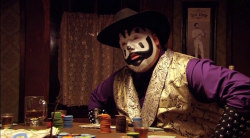
Big Money Rustlas
2010 -
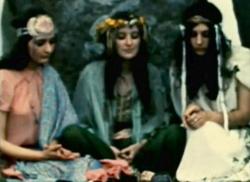
Be Glad for the Song Has No Ending
1970 -
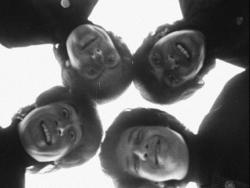
The Rutles: All You Need is Cash
1978 -
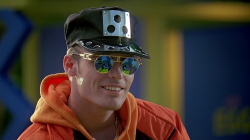
Cool As Ice
1991 -
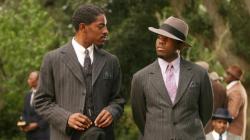
Idlewild
2006 -
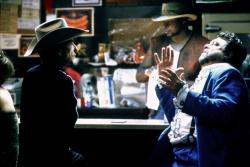
Masked and Anonymous
2002 -
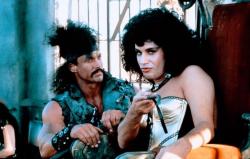
Never Too Young to Die
1986 -

Leningrad Cowboys Go America
1989 -
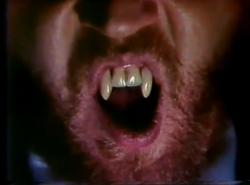
Son of Dracula
1974 -
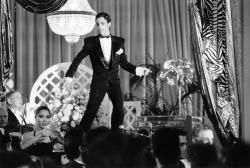
Under the Cherry Moon
1986 -
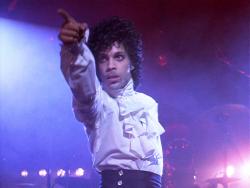
Purple Rain
1984 -
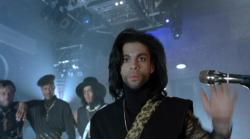
Graffiti Bridge
1990
We don’t do comments anymore, but you may contact us here or find us on Twitter or Facebook.



